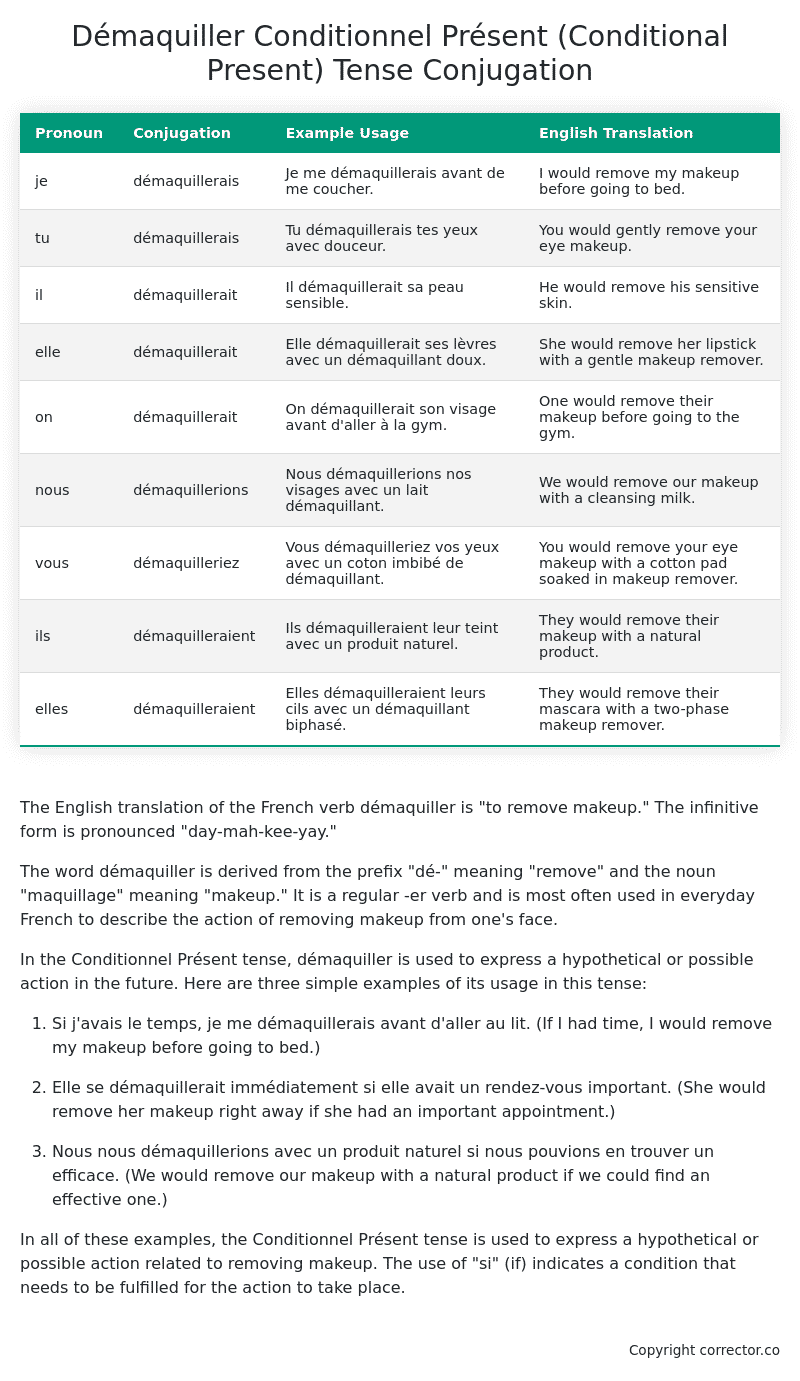Conditionnel Présent (Conditional Present) Tense Conjugation of the French Verb démaquiller
Introduction to the verb démaquiller
The English translation of the French verb démaquiller is “to remove makeup.” The infinitive form is pronounced “day-mah-kee-yay.”
The word démaquiller is derived from the prefix “dé-” meaning “remove” and the noun “maquillage” meaning “makeup.” It is a regular -er verb and is most often used in everyday French to describe the action of removing makeup from one’s face.
In the Conditionnel Présent tense, démaquiller is used to express a hypothetical or possible action in the future. Here are three simple examples of its usage in this tense:
-
Si j’avais le temps, je me démaquillerais avant d’aller au lit. (If I had time, I would remove my makeup before going to bed.)
-
Elle se démaquillerait immédiatement si elle avait un rendez-vous important. (She would remove her makeup right away if she had an important appointment.)
-
Nous nous démaquillerions avec un produit naturel si nous pouvions en trouver un efficace. (We would remove our makeup with a natural product if we could find an effective one.)
In all of these examples, the Conditionnel Présent tense is used to express a hypothetical or possible action related to removing makeup. The use of “si” (if) indicates a condition that needs to be fulfilled for the action to take place.
Table of the Conditionnel Présent (Conditional Present) Tense Conjugation of démaquiller
| Pronoun | Conjugation | Example Usage | English Translation |
|---|---|---|---|
| je | démaquillerais | Je me démaquillerais avant de me coucher. | I would remove my makeup before going to bed. |
| tu | démaquillerais | Tu démaquillerais tes yeux avec douceur. | You would gently remove your eye makeup. |
| il | démaquillerait | Il démaquillerait sa peau sensible. | He would remove his sensitive skin. |
| elle | démaquillerait | Elle démaquillerait ses lèvres avec un démaquillant doux. | She would remove her lipstick with a gentle makeup remover. |
| on | démaquillerait | On démaquillerait son visage avant d’aller à la gym. | One would remove their makeup before going to the gym. |
| nous | démaquillerions | Nous démaquillerions nos visages avec un lait démaquillant. | We would remove our makeup with a cleansing milk. |
| vous | démaquilleriez | Vous démaquilleriez vos yeux avec un coton imbibé de démaquillant. | You would remove your eye makeup with a cotton pad soaked in makeup remover. |
| ils | démaquilleraient | Ils démaquilleraient leur teint avec un produit naturel. | They would remove their makeup with a natural product. |
| elles | démaquilleraient | Elles démaquilleraient leurs cils avec un démaquillant biphasé. | They would remove their mascara with a two-phase makeup remover. |
Other Conjugations for Démaquiller.
Le Present (Present Tense) Conjugation of the French Verb démaquiller
Imparfait (Imperfect) Tense Conjugation of the French Verb démaquiller
Passé Simple (Simple Past) Tense Conjugation of the French Verb démaquiller
Passé Composé (Present Perfect) Tense Conjugation of the French Verb démaquiller
Futur Simple (Simple Future) Tense Conjugation of the French Verb démaquiller
Futur Proche (Near Future) Tense Conjugation of the French Verb démaquiller
Plus-que-parfait (Pluperfect) Tense Conjugation of the French Verb démaquiller
Passé Antérieur (Past Anterior) Tense Conjugation of the French Verb démaquiller
Futur Antérieur (Future Anterior) Tense Conjugation of the French Verb démaquiller
Subjonctif Présent (Subjunctive Present) Tense Conjugation of the French Verb démaquiller
Subjonctif Passé (Subjunctive Past) Tense Conjugation of the French Verb démaquiller
Subjonctif Imparfait (Subjunctive Imperfect) Tense Conjugation of the French Verb démaquiller
Conditionnel Présent (Conditional Present) Tense Conjugation of the French Verb démaquiller (this article)
Conditionnel Passé (Conditional Past) Tense Conjugation of the French Verb démaquiller
L’impératif Présent (Imperative Present) Tense Conjugation of the French Verb démaquiller
L’infinitif Présent (Infinitive Present) Tense Conjugation of the French Verb démaquiller
Struggling with French verbs or the language in general? Why not use our free French Grammar Checker – no registration required!
Get a FREE Download Study Sheet of this Conjugation 🔥
Simply right click the image below, click “save image” and get your free reference for the démaquiller Conditionnel Présent tense conjugation!

Démaquiller – About the French Conditionnel Présent (Conditional Present) Tense
Formation
Common Everyday Usage Patterns
Expressing Polite Requests
Expressing Hypothetical Situations
Expressing Doubt or Uncertainty
Interactions with Other Tenses
Present Tense
Past Tense
Future Tense
Conditional Perfect
Summary
Want More?
I hope you enjoyed this article on the verb démaquiller. Still in a learning mood? Check out another TOTALLY random French verb conjugation!


